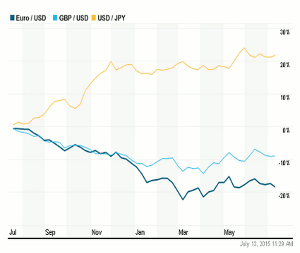Now that the markets are rapidly moving back to normal as Greece moves to the background, Barry Norman, at FXEmpire.com, shares his outlook on when he believes traders could instantly forget about the last four months and a key event he thinks could weigh heavily on the euro.
Markets are rapidly moving back to normal as Greece moves to the background. The only steps left are a vote Wednesday by the Greek Parliament and the determination of support from the ECB via the ELA. Once the vote is passed and the banks are funded, traders should instantly forget the last four months. In the meantime, the euro is trading at 1.1011 gaining 12 points in the morning session. Monday saw the currency on a roller coaster as traders tried to find an appropriate level for the euro ahead of Thursday's ECB meeting and press conference.
Many traders are expecting the ECB to extend its QE program, which will weigh heavily on the euro. The ECB recently adopted a policy of bond purchases known as quantitative easing or QE. It’s similar to what the Fed was doing in the midst of the financial crisis.
“The ECB will have to aggressively continue its QE program to simply stabilize demand after the trauma incurred over the past month. That will likely put sustained pressure on the euro in the near term,” said Boris Schlossberg, managing director of forex strategy with BK Asset Management in a report Monday.
Ahead of Mario Draghi will be Janet Yellen as she begins her two day testimony to US lawmakers. This is a standard bi-annual presentation and Ms. Yellen has already made her position on monetary policy and interest rate increases in her speech this past week. The greenback is trading at 96.93 near its highest level lately. But now that the worst case scenario for Greece appears to be in the rearview mirror, traders are focusing on the economic outlook for the United States, especially the Federal Reserve’s next steps. Some market watchers had been suggesting that the Fed might hold off on an interest rate hike in September if Greece left the EuroZone, because that event could destabilize the global financial markets. Even a few Fed members expressed concerns about Greece at their latest policy meeting in June.
Traders once again have time to look at other European currencies including the pound and the Swiss Franc. The pound sterling is leading the way in currency markets in the wake of the Greek bailout agreement. With Greece pulling back from the precipice of a euro exit, traders are switching their focus to the UK economy. The strong pound is a boost to Irish exporters, with the food and drink sector especially likely to reap competitively gains. The pound is in the green Tuesday morning adding 7 points to 1.5490. The europound is trading at 0.7108.
The safe-haven yen and Swiss franc fell after Chinese stocks rebounded and worries about Greece eased. The JPY is trading at 123.47 back to its range pre-Greece bailout crisis. The US dollar relentlessly sold-off versus the Swiss franc in the European session, sending USD/CHF to fresh weekly lows on 0.93 handle. Switzerland’s franc weakened amid speculation the nation’s central bank sold the currency to damp gains caused by investors seeking a haven from financial turmoil in Greece.
By Barry Norman at FXEmpire.com











